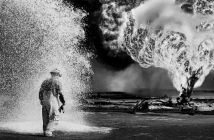Der Samurai (2014)
Cast: Michel Diercks, Pit Bukowski, Uwe Preuss
Director: Till Kleinert
Country: Germany
Genre: Fantasy | Horror | Thriller
Official Site: Here
Editor’s Note: The following review is part of our coverage of the 2015 Boston Underground Film Festival. For more information on the festival visit bostonunderground.org and follow BUFF on Twitter @BOSunderground.
It has been several days since I saw Der Samurai. While this time of reflection has allowed me to grow to appreciate just what the film tries to do and actually accomplishes, one fact remains patently unchanged. I have no idea what was real, nightmare, or ultimately what this movie was even about. There are pieces of my brain that were blown out by Der Samurai and I am slightly terrified that I may never be able to relocate them.
It all starts simply enough in a sleepy German town with local cop Jakob (Michel Diercks) and an elusive wolf that is a nuisance on the town. The monotony of his job and the quiet nature of the small town really set the mood for this first act. Once we move into the second act and the introduction of the titular Samurai (Pit Bukowski) all semblance of sanity and connection with reality goes out the door. The transition is surprisingly gradual, preventing the film from exhibiting an uneven or sudden atmosphere. No, writer-director Till Kleinert, wants to sneak up on you, leaving you unaware of the mayhem and insanity until it is far too late for you to escape.
The deeper you go into the film the farther you depart from reality, but it is done like a dream…
Drawing upon a vast history of German expressionism, Der Samurai draws comparisons to more accomplished and respected German fare like The Cabinet of Dr. Caligari or The Testament of Dr. Mabuse. Like the early work of Fritz Lang, Till Kleinert wants his audience to be confused, to not understand whether or not what is being seen can be trusted. The deeper you go into the film the farther you depart from reality, but it is done like a dream, where there are moments of tangibility giving you the false sense that it is safe or honest, when this hyper real world bares only a passing resemblance to our own. Kleinert has an impressive grasp on his desired visual aesthetic. The camera’s movements volley between frenzied abandon and creepy stillness. It is difficult to emotionally process at times, as the constant back and forth between contemplation and violence is off putting and disorienting.
 The violence is nearly giallo in execution. Geysers of blood and a plethora of decapitated heads are littered about in the Samurai’s wake. In addition to the anime-esque nature of the violence it toils in the surreal and absurd. Returning to this question of what is real, Kleinert joyously frolics in this genre of nightmare surrealism. He has no problem dealing with the more grandiose and obviously disturbing elements, delivering a piece that is consistently visually captivating. However, as he attempts to imbue meaning into the nightmare he falters somewhat majorly.
The violence is nearly giallo in execution. Geysers of blood and a plethora of decapitated heads are littered about in the Samurai’s wake. In addition to the anime-esque nature of the violence it toils in the surreal and absurd. Returning to this question of what is real, Kleinert joyously frolics in this genre of nightmare surrealism. He has no problem dealing with the more grandiose and obviously disturbing elements, delivering a piece that is consistently visually captivating. However, as he attempts to imbue meaning into the nightmare he falters somewhat majorly.
As I continued to try and process just what was happening in this strange world, I began to become more and more upset. See the problem with Der Samurai is not necessarily its story but the troubling nature of the themes it gleefully trounces through. The Samurai seems to represent Jakob’s own battle with homosexuality. However, some of the Samurai’s general makeup and the actions taken would lead one to believe that Kleinert sees homosexuality as an inherently bad thing. One in which not only does society instinctually reject it, but its own response to rejection is one of violence and destruction.
See the problem with Der Samurai is not necessarily its story but the troubling nature of the themes it gleefully trounces through.
As the Samurai rages through the town, clearing a path with his phallic sword, he does all that he can to bring Jakob along. Michel Diercks’ performance is adequate in communicating this struggle, but again his fear is not for himself, but rather all those around him. He is attempting to protect the town from this murderer in a dress, fulfilling his role as maintainer of peace. Moments of appeasement to the Samurai feel false, merely attempts to distract so that Jakob may intercede. It is as if the film is saying that Jakob’s homosexuality must violently confront all those in the town and cause destruction to yield understanding. The homophobic ideas needled themselves into my brain and through this lens, the film I was beginning to respect and admire changed into something I wanted nothing to do with.
For much of its runtime, Der Samurai feels like a modernization of a lost sect of German cinema. A slow descent into the nightmarish, its aspirations are as impressive as its execution. First time writer-director Till Kleinert has delivered a surreal and troubling tale of violence and discovery that is unlike anything in recent memory. Unfortunately, his visual grace and rapid pace become mired with a message that is troubling at best. As a discussion on the nature of homosexuality and the difficulty of coming out, it takes a decidedly negative bent. Even this flirtation with bigotry and rampant homophobia is enough for the audience to question whether or not this is poor taste just for the sake of it. Der Samurai is largely an explosively fresh and visually mesmerizing tale of nightmares come to life. However, the cards it plays eventually seem of nothing more than the mean-spirited variety, which can’t help but undercut all of the talent it assuredly has.
Der Samurai is largely an explosively fresh and visually mesmerizing tale of nightmares come to life. However, the cards it plays eventually seem of nothing more than the mean-spirited variety, which can’t help but undercut all of the talent it assuredly has.



